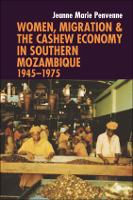Women, Migration & the Cashew Economy in Southern Mozambique
1945-1975
Abstract
Analyses the lives and livelihoods of the female cashew shellers in Mozambique's capital in the colonial era, during which the industry grew to be a major export, and relates how the women played a fundamental, but previously underappreciated, role in the colony's economy. JOINT RUNNER-UP FOR THE 2017 AIDOO-SNYDER BOOK PRIZE Between the late 1940s and independence in 1975, rural Mozambican women migrated to the capital, Lourenço Marques, to find employment in the cashew shelling industry.This book tells the labour and social history of what became Mozambique's most important late colonial era industry through the oral history and songs of three generations of the workforce. In the 1950s Jiva Jamal Tharani recruited a largely female labour force and inaugurated industrial cashew shelling in the Chamanculo neighbourhood. Seasonal cashew brews had long been an essential component of the region's household, gift and informal economies, but bythe 1970s cashew exports comprised the largest share of the colony's foreign exchange earnings. This book demonstrates that Mozambique's cashew economy depended fundamentally on women's work and should be understood as "whole cloth". Drawing on over 100 interviews, the rich narratives convey layered histories: the rural crises that triggered the flight of women, their lives as factory workers, widespread payment and wage fraud, the formation of innovative urban families, and the health costs that all African families paid for municipal neglect of their neighbourhoods. Jeanne Marie Penvenne is Professor of History, and core faculty in International Relations, Africana and Women, and Gender and Sexuality Studies at Tufts University.. She is the author of the Herskovits shortlisted African Workers and Colonial Racism (James Currey/Heinemann, 1995)
Keywords
feminismISBN
9781787447240, 9781787447240Publisher
Boydell & BrewerPublisher website
https://boydellandbrewer.com/Publication date and place
Woodbridge, 2015Imprint
James CurreyClassification
African history
Sociology: work & labour
Colonialism & imperialism


 Download
Download